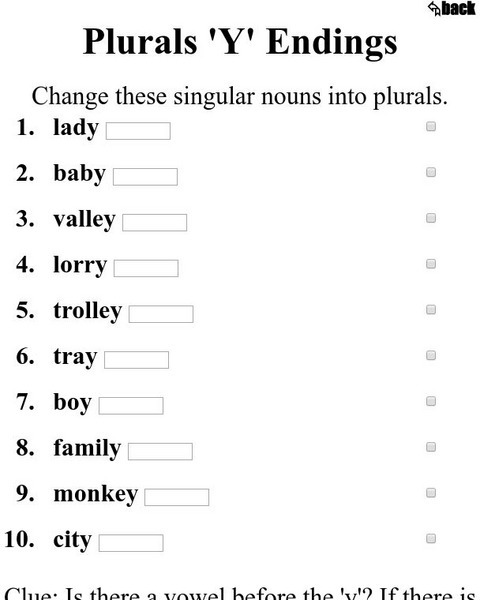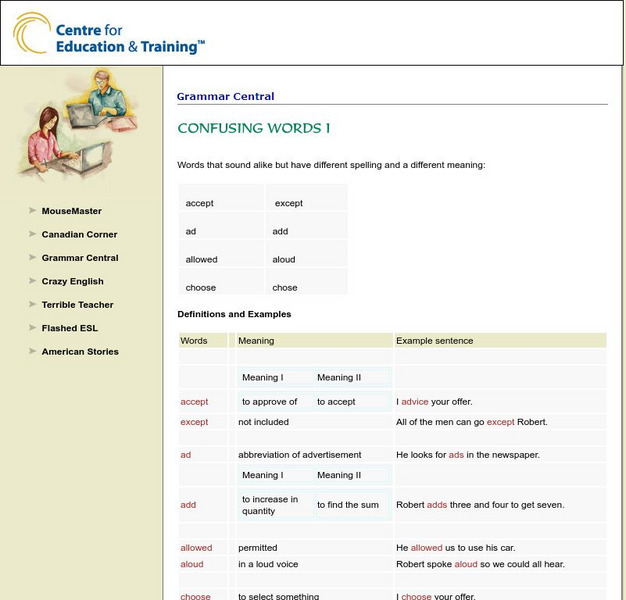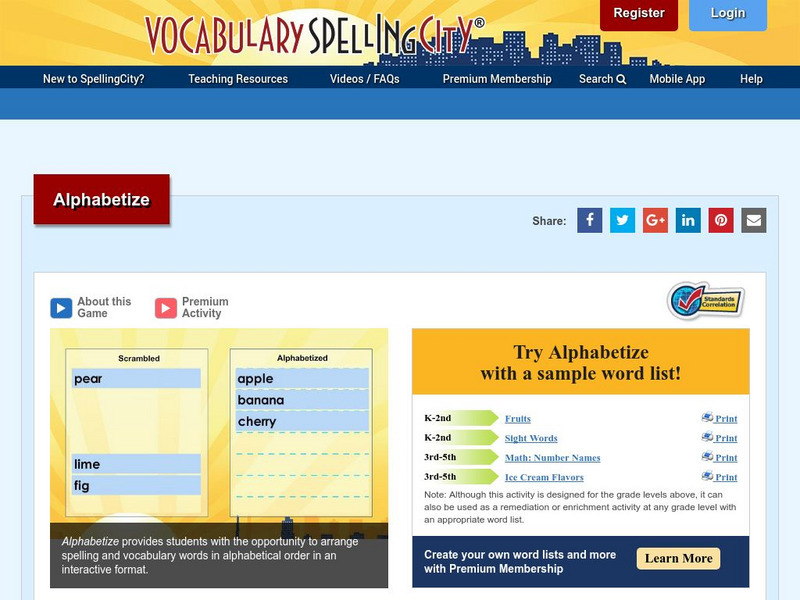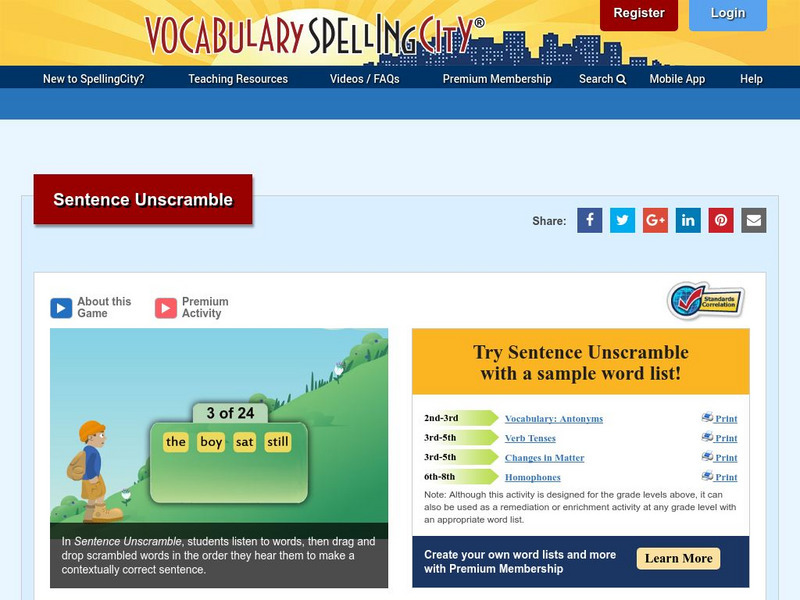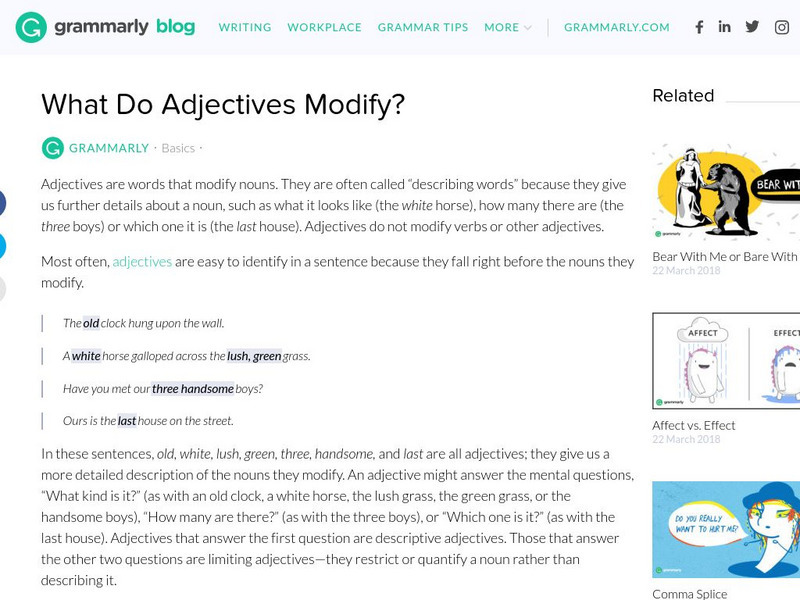Other
Lancashire Schools: Literacy: Plural "Y" Endings
This site offers a self-scoring quiz changing singular words that end in Y to plurals. Students type in the correct spelling of the plural.
Quia
Quia: Map Skills
Students will be challenged when they take this interactive grammar quiz? This quiz asks students to identify whether or not the sentence is grammatically correct. Come and check it out.
University of Victoria (Canada)
University of Victoria: Regular Plurals of Nouns
Learn how to make nouns plural. This concise lesson explains the process and contains a chart with examples. Practice your new skill with exercises at the bottom of the page.
Other
Linc Home Study: Grammar Central: Confusing Words 1
This is a tutorial for words that sound alike but are spelled differently and have different meanings.
Quia
Quia: Capitalization: Rags to Riches
This is a capitalization and punctuation game for early readers. Students win gold stars for selecting the correct answers. The game is available in Java or HTML versions.
E Reading Worksheets
E Reading Worksheets: Capitalization Worksheets
This learning module provides remediation with capitalizing nouns. Practice with capitalizing nouns is provided with through worksheets, an online site, and a video tutorial [2:21]
Vocabulary Spelling City
Vocabulary Spelling City: Alphabetize
In this free version of the game, choose from four sets of words, depending on the grade level. The word list is presented and you must put the words in alphabetical order. Includes 'Spelling Test' and 'Teach Me' features.
Vocabulary Spelling City
Vocabulary Spelling City: Sentence Unscramble
In this free version of the game, choose from four sets of words, depending on the grade level. Each word is used in a sentence, and the words are mixed up. Students must then unscramble them so that they make sense. Includes 'Spelling...
TES Global
Tes: When Do We Use Capital Letters? Poster?
[Free Registration/Login Required] Capitalization rules are provided on this visually-appealing poster. Students will find reminders about capitalizing the pronoun I, beginnings of sentences, names, abbreviations, and abbreviations.
Other
Spelling Rules: Words Ending in Y
Chart with rules and examples for adding suffixes to words that end in -y.
Grammarly
Grammarly Blog: Spelling Words With Double Consonants
Spelling rules and examples for words with double consonants in both single and multiple syllable words. L.11-12.2b Spelling
Grammarly
Grammarly Blog: Every Time
This page explains and provides the rules for use of the two-word compound "every time."
Grammarly
Grammarly Blog: Capitalization
This page reminds the writer to follow capitalization rules including for beginning of sentences, proper nouns, and titles of people and works.
Grammarly
Grammarly Blog: What Are Adjectives?
This blog article explains what adjectives are, what they can do in sentences, and provides examples of each.
Grammarly
Grammarly Blog: Capitalization:titles of Books, Articles, Songs
This page explains the rules for capitalizing titles: In informal writing all words may be capitalized, but in formal writing, articles, conjunctions, and prepositions are NOT capitalized unless they begin a sentence. Examples are provided.
Grammarly
Grammarly Blog: What Do Adjectives Modify?
This blog article explains that adjectives modify nouns and provides examples. It also discusses predicate adjectives.
Grammarly
Grammarly Blog: Abstract Nouns
This page explains that an abstract noun is not identifiable by any of the five senses and provides examples.
Grammarly
Grammarly Blog: Capitalization: Family Relationships (Used as Proper Names)
This page explains that family relationships such as Mom, Dad, Uncle, and Aunt are capitalized if they are used as names, but are not capitalized if used as common nouns such as my mom, his dad, etc. Examples are provided.
Grammarly
Grammarly Blog: Closed Compound Words
This page explains closed compound words, one word compounds formed by two words, and provides examples.
Grammarly
Grammarly Blog: Possessive Case of Nouns: Rules and Examples
This page expains the rules for forming possessive nouns and provides examples.
ClassFlow
Class Flow: At Words
[Free Registration/Login Required] After completing this lesson, students will be able to identify and construct words having the ending -at.
Grammarly
Grammarly Blog: Adjectives and Adverbs What's the Difference?
This blog article focuses on adjectives and adverbs including their purpose and the confusion between them. It offers links pertaining to adjective and adverb use and misuse.
Robin L. Simmons
Grammar Bytes: Word Choice: Exercise 1: Their, There, and They're
Complete these 20 sentences by choosing the correct form of their, there, and they're.


